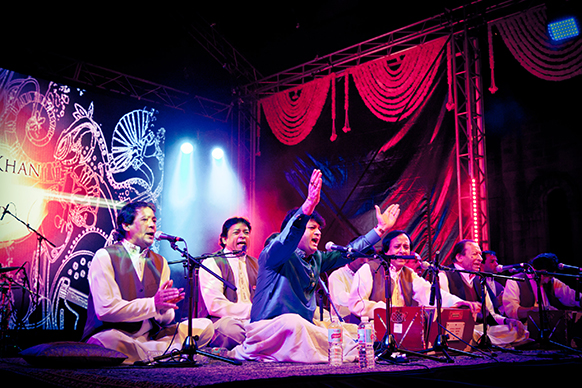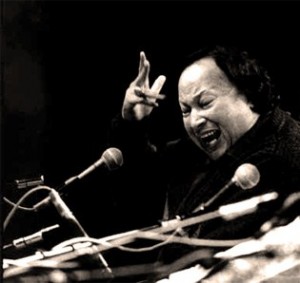A Closer Look at Qawwali: Interview with Farina Mir
Photo: Asif Ali Khan Qawaali Music of Pakistan performs.
On Friday, March 21, 2014 at 8 pm, UMS presents Asif Ali Khan Qawwali Music of Pakistan in Rackham Auditorium. A protege of the late, legendary Nusrat Fateh Ali Khan (1948-97), Asif Ali Khan performs the beautiful tradition of qawwali music of Pakistan and India. Whether you’re an adherent of the Sufi faith or not, the aesthetic experience of qawwali music is unique, inspiring, and inclusive.
To hear more, we talked with Farina Mir, the Associate Professor of History and Director of the Center for South Asian Studies at the University of Michigan. She is also the author of The Social Space of Language: Vernacular Culture in British Colonial Punjab (University of California, 2010), and co-editor of Punjab Reconsidered: History, Culture, and Practice (Oxford University Press, 2012).
Farina was fortunate enough to hear Nusrat Fateh Ali Khan perform, and the experience changed the professional focus of her life.
UMS: Tell us about your experience seeing Nusrat Fateh Ali Khan.
Farina Mir: I heard Nusrat Fateh Ali Khan at a charity dinner in New York City when I was only a junior in college. At the time, I hadn’t heard of the artist and was totally unfamiliar with the art of qawwali. I had only just started studying South Asian history; though, it quickly became a passion. I was particularly drawn to the history of the partition of India in 1947, which had led to the creation of Pakistan. This was a cataclysmic event, in which at least 17 million people migrated across newly created international borders (the largest peace time-migration of the twentieth century) and as many as one million people died in mass civil violence between members of different religious communities. I was particularly troubled by the violence of partition. The history I had learned—the standard history of the event at the time—found the roots of partition in “communalism,” antagonism along religious lines. It was a history that led one to think of Hindus and Sikhs, on the one hand, and Muslims on the other, as mutually antagonistic communities. What I saw at the charity concert undermined for me the certitude of this historical argument.
Many Voices
The audience for this concert wasn’t large; a relatively small hotel ballroom with people sitting at tables of 8 or 10, so maybe 200-300 people. Most of those in attendance were South Asian Muslims, but there was at least one table of Sikhs and Hindus. They stood out from the rest of the crowd because some of the men wore turbans and had unshorn beards. What stood out less than their presence—I knew from my own experience of growing up in the South Asian diaspora that members of all religious communities from the subcontinent intermingle socially—was their repeated requests for Nusrat Fateh Ali Khan to sing the compositions of particular Sufi poets. Qawwali as a genre is Sufi mystical poetry set to music. How were non-Muslims so familiar with Muslim Sufi poets, I wondered? And not only were they familiar with the poets’ names, but with particular compositions. They were making requests by reciting lines of Punjabi verse. And when Nusrat acknowledged their requests, I was struck by the looks of rapture of everyone around me, Hindu, Muslim, and Sikh alike.
An Enlightening Discovery
I, too, was taken in by the performance, by the pure pleasure of it—Nusrat Fateh Ali Khan and the qawwali form are nothing if not immensely powerful and emotive. But I was also taken in by the context of the performance. It produced a dissonance for me. I was struck by how the history books I was reading all emphasized Hindu, Sikh, and Muslim difference, yet what I saw that evening was a shared experience that defied the expectations produced by those history books. I began to wonder if there were historical antecedents to what I experienced that night. This led me to consider the historical role of the Punjabi language and its literary texts, including those of Sufi poets I heard at that performance, as the site for shared experiences among Hindus, Muslims, and Sikhs. What was hinted at in my experience that evening—the meaning, power, and pleasure of texts shared by members of different religious communities—led me to pursue a PhD in South Asian history, and today I teach in the history department at U-M. My book, The Social Space of Language: Vernacular Culture in British Colonial Punjab, provides one set of answers to the questions that emerged for me that night, with and through Nusrat Fateh Ali Khan’s amazing performance.
UMS: What do you think audience members who aren’t of the Sufi faith or no little about Sufi music will get out of the performance?
FM: As my comments above have suggested, there is undoubtedly an aesthetic beauty and emotional power to qawwali as an art form. It’s a pleasure to experience, no matter what one’s religion, or if one has no religious disposition at all. For those who know that this is a form of music associated with Sufi devotionalism, I think it will expose them to an aspect of Islam and Muslim devotion that has played a very significant role in Muslim devotion in the subcontinent historically, and continues to do so to this day.
UMS: What do you think people should look out for in seeing Asif Ali Khan’s performance with UMS this season?
FM: One of the pleasures of live performances of qawwali (as with other genres of Indian vocal performance) is artist improvisation. The genre lends itself to vocal improvisation, all within the bounds of a rigorous tradition of ragas and beat. Although improvisation is caught on recordings of live performance, the ability to see it in creation, as a response to a given environment is something you just can’t get off a CD!
UMS: Can you suggest some musical selections from Nusrat Fateh Ali Khan that might give our readers an entry point into his music? What’s important to you or interesting about these selections?
This is a hard question because there are so many dimensions to Nusrat Fateh Ali Khan’s music. One, of course, is that of aesthetic pleasure; the joy of the music/composition. This is accessible to anyone. The other, is the content of the verses set to music. Nusrat performed compositions in Persian, Urdu, and Punjabi (among other languages). Each has an important place in his repertoire. Three stand out for me, one in each language:
Qawwali in Farsi by Hazrat Amir Khusro in Raga Khamaj. I am not fluent in Persian, so can’t speak to the content of the poetry being performed in this composition, but what I love about this qawwali is how it ties contemporary practice, in time and space, to the subcontinent and the reputed creator of the art form of qawwali. Amir Khusro is a thirteenth century poet who was a devotee of the Sufi saint Nizamuddin Auliya. Amir Khusro is buried in the shrine complex that emerged around the tomb of Nizamuddin Auliya in Delhi, and one can today visit his tomb, the shrine of his patron and Sufi master, and hear qawwali—usually poems in praise of the Sufi saint—in the precincts of his shrine. Khusro was a Sufi adept, as well as a gifted poet and music theorist. He is considered the father of Hindustani classical music, and it is through his own devotional practice that qawwali as a genre was born.
Main Jana Jogi de Naal. This is a Punjabi qawwali that draws on the poetry of the Sufi saint Bulleh Shah. The text is a Sufi poem that points to the hypocrisy of empty ritual, pointing to love (for the divine) as true faith. It’s an immensely evocative poem in its language and its allusions, and is performed with a level of emotion that conveys the conviction of the text, even if you aren’t a Punjabi speaker!
Modern qawwali by Allama Iqbal in Raga Bilawal. Allama Iqbal (Muhammad Iqbal) is among the most renowned Urdu poets of the twentieth century. This qawwali takes one his most famous poems, Shikwa (Complaint), and performs it in the genre of qawwali. Iqbal’s poem is a political tract about the place and status of Muslims in the early twentieth century, rendered as a complaint to God. It is a brilliant poem that captures an important moment in South Asian history. I like this qawwali not only for its beautiful verse, but for the ways it exemplifies how flexible and adaptable the qawwali genre is, particularly in the hands of someone as talented as Nusrat Fateh Ali Khan.
Did you listen to Farina’s music selections? Were you familiar with qawwali before? What do you think?
UMS brings Asif Ali Khan to Ann Arbor in conjunction with UMMA’s exhibition of Doris Duke’s Shangri La: Architecture, Landscape, and Islamic Art on view January 25 – May 4, 2014. Learn more about the exhibition.








